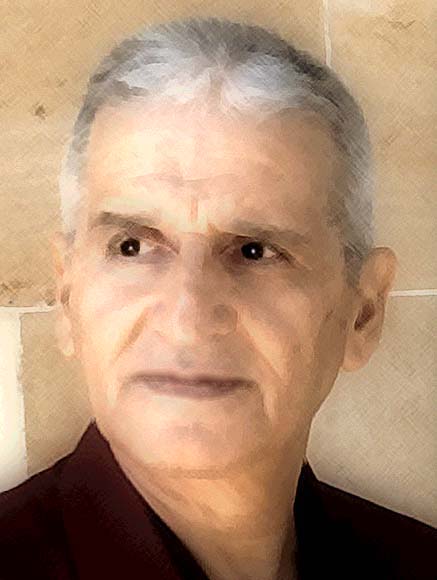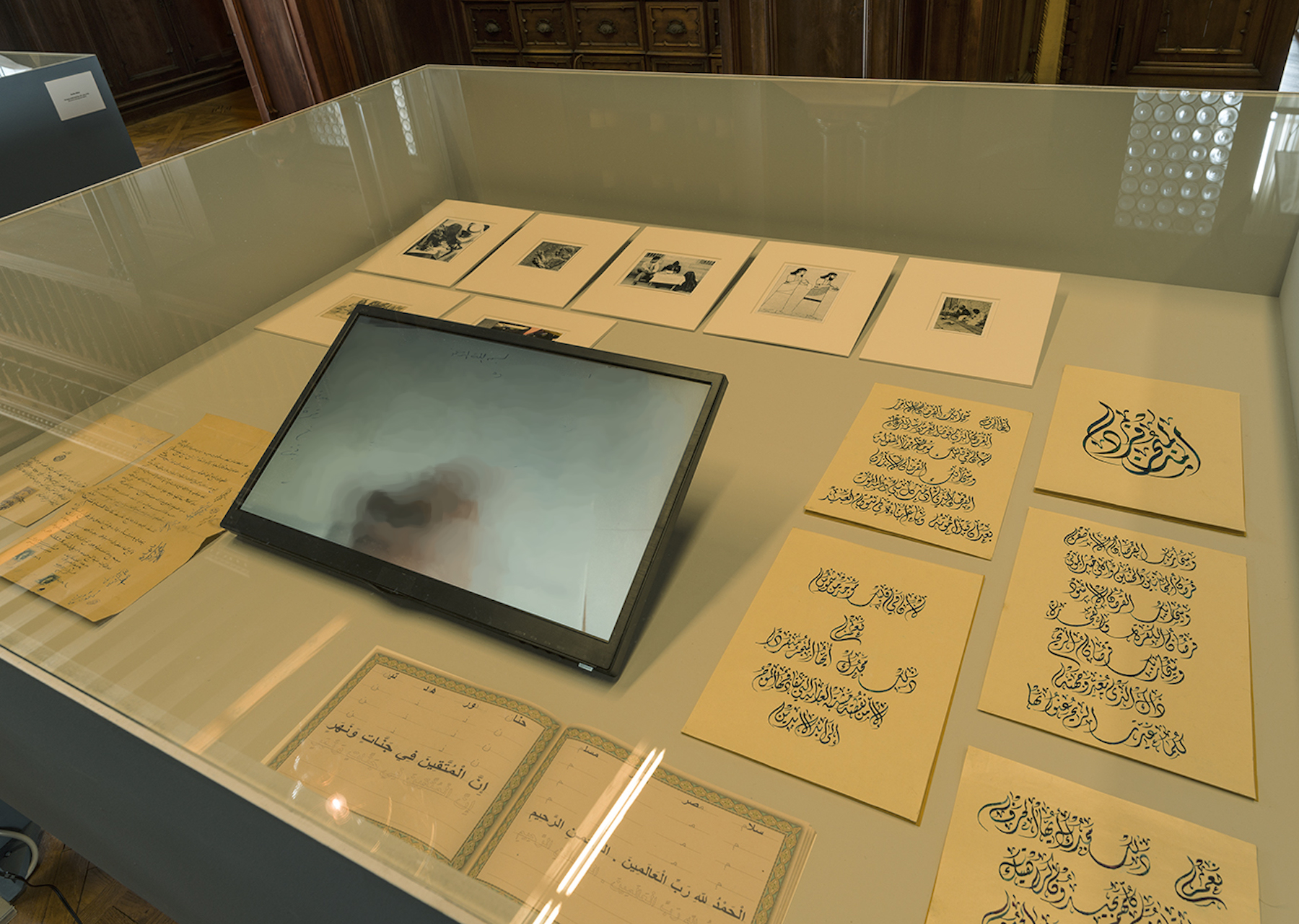|
“I am a letter, therefore I am a poet.”
Adeeb Kamal Ad-Deen
Writing is one of the seven themes of ‘Archaic,’
the Iraq Pavilion at the 57th Venice Biennale.
In light of this, Ruya speaks to the
Iraqi-Australian poet Adeeb Kamal Ad-Deen
(b.1953, Babel Province), whose
works weaves together Sufi mysticism and
poetry, often focusing on the letter as a
vehicle for the imagination. Kamal Ad-Deen has
published 19 poetry collections in Arabic and
English, and his work has been translated to
English, French, Italian, Persian, Spanish and
Urdu among other languages. He was awarded the
Grand Poetry Award (1999) in Iraq. His poems
appear in the anthologies The Best Australian
Poems 2007 (ed. Peter Rose) and The Best
Australian Poems 2012 (ed. John Tranter), the
Australian literary journals Southerly, Meanjin
and the Friendly Street Poets. Kamal Ad-Deen’s
poem ‘You Who Sail Alone’ accompanied one of the
artworks at the exhibition, and was translated
and published in the exhibition catalogue
Archaic.
Iraqi literature has many roots: ancient epics,
Islamic poetry, stories of djinn and demons,
oral Bedouin traditions, coffee-shop gossip,
music and contemporary urban life. How did you
find your voice as a poet?
- Poetry, as I understand it, is the attempt to
crack life’s code, to understand its secrets,
profound and fleeting, sublime and ridiculous,
and the attempt to make peace with its endless
trials. Poetry is the living mirror of all that
lives in life. It is a spark that gleams in the
deepest, darkest regions of the mind. It begins
as a response to a tear or an alarming
situation, to a wounding word or an exciting
spectacle, to a sweet song or a painful memory.
The true poet is capable of seizing on this
spark (blessed or cursed, wounded or tormented,
as the case may be) and using it to set alight
their memory, which is like dried and flammable
firewood, at which the images and words billow
out in clouds.
The letter is what sets me apart as a poet. You
might say it’s my creative identity, through
which I have expressed the tormented cries and
dreams of my soul over the course of nineteen
collections, starting with Details (Najaf: ,
1976) and running right through to my latest
book Letter of Water (Beirut: Dhafaf,
2017). In my opinion, the Arabic letter
has different “levels”: the structural, the
veiled, the indicative, the symbolic, the
cultural, the mythic, the spiritual, the
supernatural, the magical, the talismanic, the
rhythmic, and the childlike. I have written
hundreds of letter poems that embrace these
levels as a reference. These poems use the
letter both as a veil and a means to uncover
this veil, or as a tool and a means to examine
the tool. The letter is a private language with
its own symbols, signifiers and references that
unravel themselves and the language itself. I
have spent decades devoted to the letter, so
that it has become my destiny, which binds me
and will bind me till the end. So that’s why I
can say: I am a letter, therefore I am a poet.
In your poem ‘You Who Sail Alone’ you compare
the letter to a passing ship, and the dots on
these letters as a ‘new sea the pirates cannot
easily sail’. Could you expand a little on these
images?
- My approach to the letter varies in all my
poetry – not just the poem presented here. In
Sufism the dot or point represents Being, the
centre of the universe and the Greater World. As
a poet, I also reference the dot’s other
meanings, not only through Sufi symbolism. In
many of my poems the dot is a centre or seat for
the heart, the soul, the body and perception.
What distinguishes my own experiments with
letters from ancient Sufi literature, is that
the Sufi approach is primarily an intellectual
one (and occasionally a talismanic one) only to
be understood by the most elevated initiates. I
worked hard to make my approach poetic by
deploying concrete imagery, since I believe that
intellectualism in this sense is one of poetry’s
bitterest enemies. I also work to ensure that it
is accessible to everyone without, at the same
time, losing the initiates (or even the most
elevated initiates). Therein lies the aesthetic
challenge: the poetic/philosophical aspect of my
lettering experiments. As for the letter, it is
the vehicle for the miracle of the Quran, which
is the beginning and end of knowledge.
It seems that you’ve built a world out of
letters, how do you imagine this world to exist
visually?
-The letter is my identity: spiritual, artistic,
aesthetic, overt and secret. It appears in my
poetry in a variety of images and in numberless
forms: as the lover and the beloved, the king
and the vagrant, the guide and the lost, the
wise and the gone-astray, the ascetic and the
sybarite, the learned and the wrong, the saint
and the madman, the one who remembers and the
one who forgets, the contemplative and the
boisterous, the old man and the child, the man
and the woman, the voice and the echo, the soul
and the body, peace and war, the executioner and
the victim, the distant and the near at hand,
and so on.
The earliest known examples of writing originate
in Mesopotamia, but in modern-day Iraq some 20%
per cent of the population are illiterate. What
role can writers (or poets) play in the Iraq of
today?
- The duty of the poet wherever they come from,
not just Iraq, is to hold up a mirror to the age
they live in, otherwise they become a false
witness. They have to address the major problems
of human existence, such as love, loneliness,
war, death, hunger and ignorance, in order to
shed light on their deepest depths and limitless
fine detail. The poet must point to where the
terrible flaws are, those areas where humanity
currently speaks only the language of hate,
prejudice, violence, extremism and exclusion—the
very opposite of hope, love, beauty, the right
to education and a happy life.
First and foremost, poetry is a purely aesthetic
message, but through the translucent,
unblemished, dazzling curtain of beauty we
perceive the poem’s spiritual message, which
facilitates a profound and true search for all
that is radiant in life. Poetry lends readers
powerful assistance in their fight against
darkness, backwardness and ignorance in all its
many shapes and forms, whatever it may be
called.
Your poems have been translated into a number of
languages. What challenges do your poems present
to the translator, in your opinion?
- A poet is the best person to translate poetry.
Translating poetry requires an understanding of
the poetic techniques employed all over the
world, and a genuine understanding of the
poetics of the two languages being translated.
When the translator selects words and composes a
translation, they should preserve the spirit and
poetry of the original as much as possible. In
my work as a translator, I focus on work which
is built around “themes” rather than dissonances
in language and word games. That is because
“themes” overcome many difficulties of the
translation process, retaining the delicate skin
of their artistry intact. As for poetry that
relies primarily on language games, there is
absolutely no way this can be translated
You who sail alone
Adeeb Kamal Ad-Deen
O letter,
the Red Pirate shall fight you, the
pirate who
tore down the throne and gave it
to the rabble
because your heart harbours
a wave of childhood moons.
And the Blue
Pirate shall fight you, the pirate who
pushed
everything into death’s whirlpool
having
murdered his brothers
and sold his sons in
the slave market,
because your heart harbours
a wave of suns.
And the Yellow Pirate shall
fight you,
pirate of the mad, effete,
and
those who eat the bodies of the dead.
The
Black Pirate shall fight you,
pirate of the
wicked unbelievers.
The Pirate of the Wind
shall fight you, he
who changes his course
as the wind changes its name.
Yes,
this is your glory, O letter;
all the
pirates hate you easily
because you proposed
a point
for beauty and for love
and tried
to form
if only in imagination
a new sea
the pirates cannot easily sail.
Yes,
this
is your glory, you
who sail alone
save for
your point: your bare wood
thrown back and
forth by the waves
for all eternity.
***************
Published in Ruya
Foundation’ website
in
Novembr 3, 2017
https://ruyafoundation.org/en/2017/11/themes-archaic-4
|


